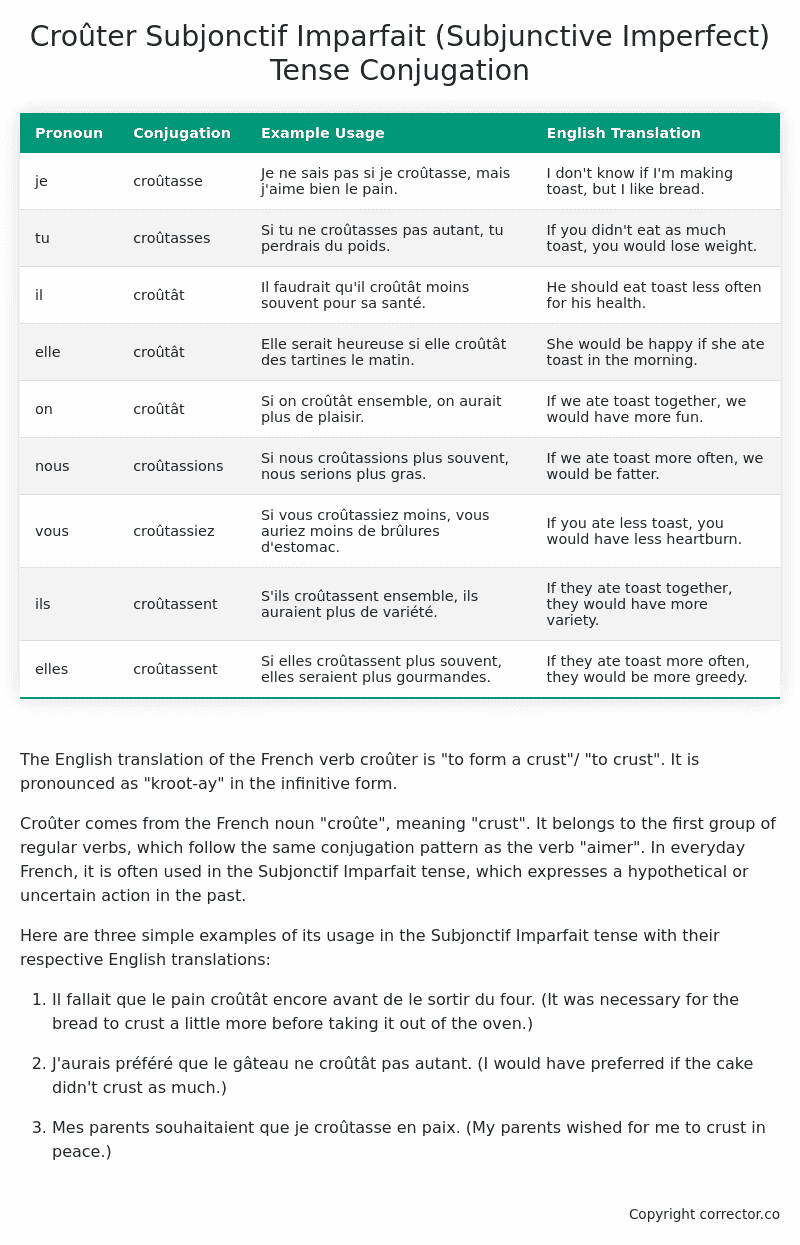Subjonctif Imparfait (Subjunctive Imperfect) Tense Conjugation of the French Verb croûter
Introduction to the verb croûter
The English translation of the French verb croûter is “to form a crust”/ “to crust”. It is pronounced as “kroot-ay” in the infinitive form.
Croûter comes from the French noun “croûte”, meaning “crust”. It belongs to the first group of regular verbs, which follow the same conjugation pattern as the verb “aimer”. In everyday French, it is often used in the Subjonctif Imparfait tense, which expresses a hypothetical or uncertain action in the past.
Here are three simple examples of its usage in the Subjonctif Imparfait tense with their respective English translations:
-
Il fallait que le pain croûtât encore avant de le sortir du four.
(It was necessary for the bread to crust a little more before taking it out of the oven.) -
J’aurais préféré que le gâteau ne croûtât pas autant.
(I would have preferred if the cake didn’t crust as much.) -
Mes parents souhaitaient que je croûtasse en paix.
(My parents wished for me to crust in peace.)
Table of the Subjonctif Imparfait (Subjunctive Imperfect) Tense Conjugation of croûter
| Pronoun | Conjugation | Example Usage | English Translation |
|---|---|---|---|
| je | croûtasse | Je ne sais pas si je croûtasse, mais j’aime bien le pain. | I don’t know if I’m making toast, but I like bread. |
| tu | croûtasses | Si tu ne croûtasses pas autant, tu perdrais du poids. | If you didn’t eat as much toast, you would lose weight. |
| il | croûtât | Il faudrait qu’il croûtât moins souvent pour sa santé. | He should eat toast less often for his health. |
| elle | croûtât | Elle serait heureuse si elle croûtât des tartines le matin. | She would be happy if she ate toast in the morning. |
| on | croûtât | Si on croûtât ensemble, on aurait plus de plaisir. | If we ate toast together, we would have more fun. |
| nous | croûtassions | Si nous croûtassions plus souvent, nous serions plus gras. | If we ate toast more often, we would be fatter. |
| vous | croûtassiez | Si vous croûtassiez moins, vous auriez moins de brûlures d’estomac. | If you ate less toast, you would have less heartburn. |
| ils | croûtassent | S’ils croûtassent ensemble, ils auraient plus de variété. | If they ate toast together, they would have more variety. |
| elles | croûtassent | Si elles croûtassent plus souvent, elles seraient plus gourmandes. | If they ate toast more often, they would be more greedy. |
Other Conjugations for Croûter.
Le Present (Present Tense) Conjugation of the French Verb croûter
Imparfait (Imperfect) Tense Conjugation of the French Verb croûter
Passé Simple (Simple Past) Tense Conjugation of the French Verb croûter
Passé Composé (Present Perfect) Tense Conjugation of the French Verb croûter
Futur Simple (Simple Future) Tense Conjugation of the French Verb croûter
Futur Proche (Near Future) Tense Conjugation of the French Verb croûter
Plus-que-parfait (Pluperfect) Tense Conjugation of the French Verb croûter
Passé Antérieur (Past Anterior) Tense Conjugation of the French Verb croûter
Futur Antérieur (Future Anterior) Tense Conjugation of the French Verb croûter
Subjonctif Présent (Subjunctive Present) Tense Conjugation of the French Verb croûter
Subjonctif Passé (Subjunctive Past) Tense Conjugation of the French Verb croûter
Subjonctif Imparfait (Subjunctive Imperfect) Tense Conjugation of the French Verb croûter (this article)
Subjonctif Plus-que-parfait (Subjunctive Pluperfect) Tense Conjugation of the French Verb croûter
Conditionnel Présent (Conditional Present) Tense Conjugation of the French Verb croûter
Conditionnel Passé (Conditional Past) Tense Conjugation of the French Verb croûter
L’impératif Présent (Imperative Present) Tense Conjugation of the French Verb croûter
L’infinitif Présent (Infinitive Present) Tense Conjugation of the French Verb croûter
Struggling with French verbs or the language in general? Why not use our free French Grammar Checker – no registration required!
Get a FREE Download Study Sheet of this Conjugation 🔥
Simply right click the image below, click “save image” and get your free reference for the croûter Subjonctif Imparfait tense conjugation!

Croûter – About the French Subjonctif Imparfait (Subjunctive Imperfect) Tense
Formation
Common Everyday Usage Patterns
Interactions with Other Tenses
Subjonctif Présent
Indicatif Passé Composé
Conditional
Conditional Perfect
Summary
I hope you enjoyed this article on the verb croûter. Still in a learning mood? Check out another TOTALLY random French verb conjugation!


